Unit 2 Great people Grammar 课件26张
文档属性
| 名称 | Unit 2 Great people Grammar 课件26张 |  | |
| 格式 | zip | ||
| 文件大小 | 1.2MB | ||
| 资源类型 | 教案 | ||
| 版本资源 | 牛津译林版 | ||
| 科目 | 英语 | ||
| 更新时间 | 2020-02-23 13:16:41 | ||
图片预览

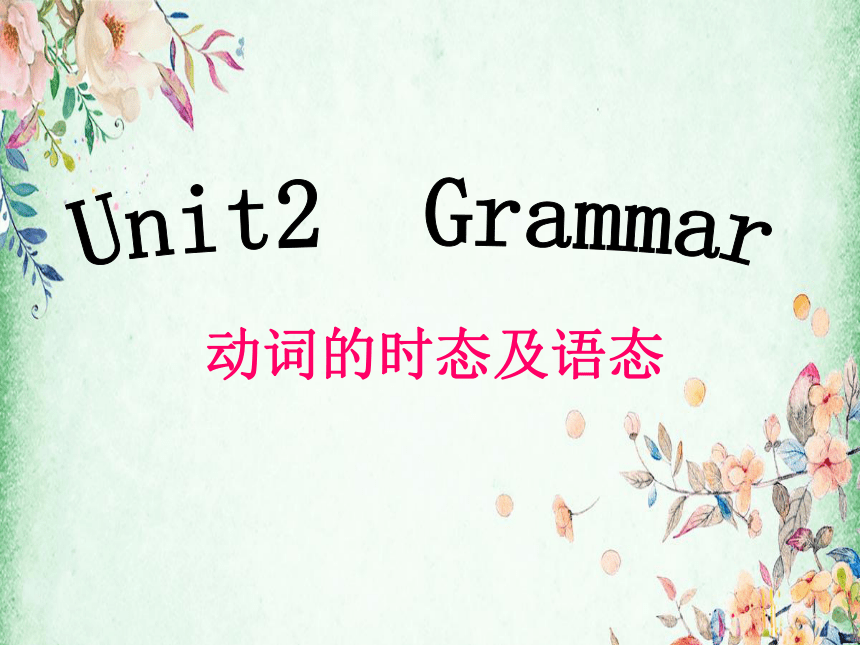
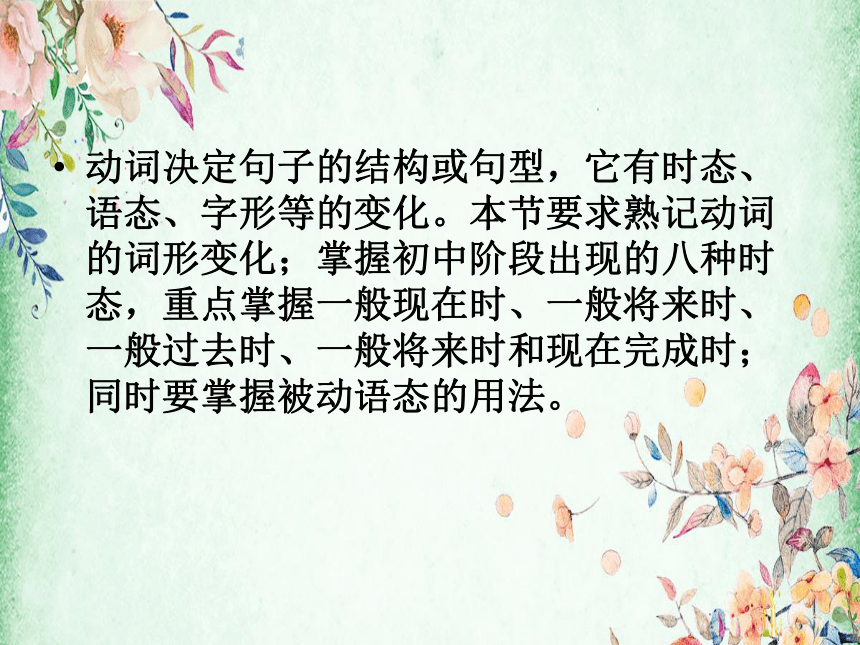
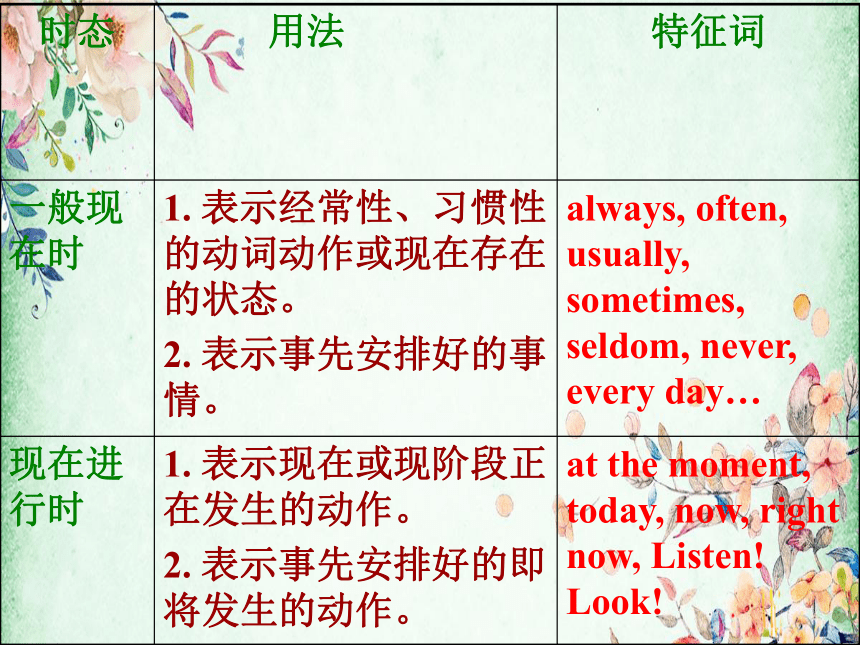

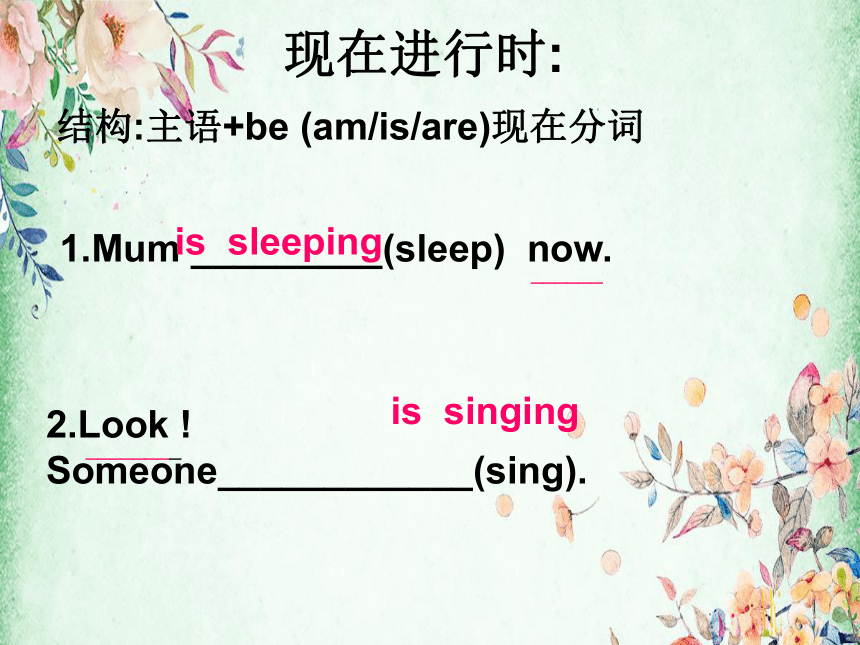

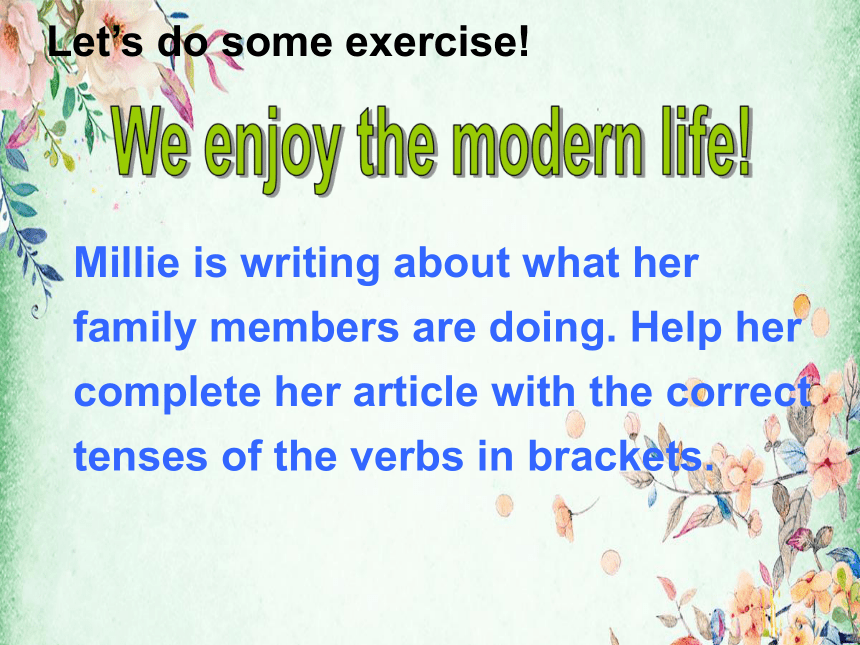

文档简介
(共63张PPT)
动词的时态及语态
动词决定句子的结构或句型,它有时态、语态、字形等的变化。本节要求熟记动词的词形变化;掌握初中阶段出现的八种时态,重点掌握一般现在时、一般将来时、一般过去时、一般将来时和现在完成时;同时要掌握被动语态的用法。
时态 用法 特征词
一般现在时 1. 表示经常性、习惯性的动词动作或现在存在的状态。
2. 表示事先安排好的事情。 always, often, usually, sometimes, seldom, never, every day…
现在进行时 1. 表示现在或现阶段正在发生的动作。
2. 表示事先安排好的即将发生的动作。 at the moment, today, now, right now, Listen! Look!
1.She often ____ (play) basketball.
2.My father ______(do) exercise every day.
_______
plays
____________
does
一般现在时结构:
1.主语+be(am/is/are)+其他
2.主语+动词原形+其他
3.主语(第三人称单数)+行为动词 的第三人称单数+其他
注意:动词的第三人称单数形式的形成
现在进行时:
结构:主语+be (am/is/are)现在分词
1.Mum _________(sleep) now.
______
is sleeping
2.Look ! Someone____________(sing).
________
is singing
基本句式:1.主语+be going to +动原
2.主语+will/shall+动原
时态 用法 特征词
一般将来时 表示将要发生的动作或存在的状态或事先安排好要做的事情。
注意:某些表示位置移动的动词,如go,come,leave,travel等,起现在进行时形式表将来时 Tomorrow,
the day after tomorrow,next day/week/ Sunday.
“in+一段时间”
Millie is writing about what her family members are doing. Help her complete her article with the correct tenses of the verbs in brackets.
Let’s do some exercise!
I (1) _______ (have) a day out with my classmates this Saturday, so I (2) ____ (need) a pair of trainers. Mum (3) _________ (shop) online for me now. She often (4) _____ (shop) online. Dad (5) __________ (search) for information on the Internet. He (6) _______ (visit) Japan next week. Grandpa (7) ________ (read) the newspaper and Grandma (8) _________ (watch) TV. I (9) _____ (want) to write an email to Wendy before I (10) ____ (go) to bed.
will have
need
is shopping
shops
is searching
will visit
is reading
is watching
want
go
时态 用法 常用特征词
一般过去时 1. 过去发生或过去经常发生的动作。
2. 过去存在的状态。 yesterday, two years ago, last week, the other day, in 1999
过去进行时 1. 表示过去某个时刻正在发生的动作
2. 过去同一时间里同时发生的两个动作。
3. 过去一个时间段内持续发生的动作。 at this time yesterday, from… to… , last night…
一般过去时的结构:
主语+动词的过去式+其他
注意:动词过去式的构成
过去进行时的结构:
主语+be (was/were) +doing+其他
e.g.: She ________(go) to the zoo yesterday.
went
e.g.: I_____________ (go) shopping at 5:00 yesterday afternoon.
was going
Simon and his friends are talking about what they did after dinner last night. Complete their conversation with the correct tenses of the verbs in brackets.
Simon: I (1) ____________ (watch) a wonderful football match from 7 p.m. to 8:30 p.m. yesterday. My favorite team (2) _____ (win) the match.
Millie: I (3) __________ (write) an email to Wendy at 7 p.m. yesterday. She (4) ____ (send) me an email last week.
Sandy: I (5) _____________ (practise) playing the piano the whole night. I (6) ____ (take) part in a competition this morning.
was watching
won
was writing
sent
was practising
took
Peter: Last night, I (7) ______ (find) a website about travelling in space. I (8) ___________ (read) passages on the website while you (9) ___________ (play) the piano, Sandy.
Daniel: I (10) __________ (talk) to Aunt Jane on the phone at 7:30 yesterday evening. She (11) ______ (call) me the day before yesterday, but I (12) _______ (be not) at home then.
found
was reading
were playing
was talking
called
was not
时态 用法 注意
一般过去时 只强调过去的动作或状态,不与现在发生联系 时态状语是过去的,yesterday, in 1998等。
现在完成时 1. 强调过去发生的动作对现在产生的结果或影响。
2. 强调过去发生的动作一直持续到现在。
3. 强调过去某个动作到现在已经发生多少次。 1. already, yet, ever, just, recently…
2. 在肯定句中与“since +过去点时间、for +段时间”连用时,谓语动词必须是延续性动词。
have
keep
be open
be on
be here
be there
be over
be dead
be in … / be a member of…
been married
转换
非延续性动词 延续性动词
buy
open
close
begin/ start
come
go
finish
die
join
get married
The film has started for over ten minutes. (误)
The film has been on for over ten minutes. (正)
(与for, since等表示从过去到现在的时间段连用时,肯定句中要用延续性动词)
电影已经开始十多分钟了。
Millie is writing about some modern inventions that have changed the way we live. Help her choose the correct words in brackets to complete her article.
Many modern inventions (1) __________ (make/ have made) a great difference in our life. They (2) ____________ (changed/ have changed) the way we live.
In ancient times, people (3) _____ (used/ have used) salt to help them keep fish or meat for a longer time. Fresh food would go bad in summer in a few hours. The invention of fridge (4) _________ (solved/ has solved) this problem.
have made
have changed
used
has solved
In the past, people (5) _______ (washed/ have washed) their clothes by hand. It (6) ____ (was/ has been) tiring, and it (7) _____ (took/ has taken) a lot of time. With the invention of the washing machine, people (8) _________ (had/ have had) more time to relax.
In the old days, people (9) ________ (travelled/ have travelled) by ship. Now planes (10) _________ (made/ have made) journeys more comfortable.
washed
was
took
have had
travelled
have made
手工
牛刀初试:
1.-It seems that you have learnt a lot about Chengdu.
-Of course. I ______here for ten years.
A. have been in B. have been
C. have come D. came to
2.A new high-speed train railway station ______in Hechi in five years.
A. will build B. will be built
C. has built D. has been built
B
B
3.-It is said that the number of forest parks in Guangdong_______ to more than 1,000 so far. A. increase B. increased C. has increased D. will increase 4.-What is Bill doing right now? -He____ soccer. He ______soccer every Saturday. A. plays; plays B. plays; is playing C. is playing; plays
5.-When will A Bite of China III begin tonight?
-It _____for ten minutes.
will begin B.has begun C. will be on
D. has been on
C
C
D
6-There ____great changes in Tianshui in next ten years.
A. are B. were C. will be D. are going to have
7.-Do you still play basketball?
-Oh, no. I ____ it for the past two years.
A. haven’t played B.didn’t play
C. won’t play D.hadn’t played
C
A
-__ you __ a wash yet? -Yes, I ____ a moment ago. A. Did, have; have washed B. Did, have; washe C. Have ,had; washed D.Have,had; have washed
9.- Howard, I haven’t seen your mum for a long time.
She _____London on business fo several days.
A. went to B. has gone to C.has been to
D. Has been to
C
B
动词的时态及语态
动词决定句子的结构或句型,它有时态、语态、字形等的变化。本节要求熟记动词的词形变化;掌握初中阶段出现的八种时态,重点掌握一般现在时、一般将来时、一般过去时、一般将来时和现在完成时;同时要掌握被动语态的用法。
时态 用法 特征词
一般现在时 1. 表示经常性、习惯性的动词动作或现在存在的状态。
2. 表示事先安排好的事情。 always, often, usually, sometimes, seldom, never, every day…
现在进行时 1. 表示现在或现阶段正在发生的动作。
2. 表示事先安排好的即将发生的动作。 at the moment, today, now, right now, Listen! Look!
1.She often ____ (play) basketball.
2.My father ______(do) exercise every day.
_______
plays
____________
does
一般现在时结构:
1.主语+be(am/is/are)+其他
2.主语+动词原形+其他
3.主语(第三人称单数)+行为动词 的第三人称单数+其他
注意:动词的第三人称单数形式的形成
现在进行时:
结构:主语+be (am/is/are)现在分词
1.Mum _________(sleep) now.
______
is sleeping
2.Look ! Someone____________(sing).
________
is singing
基本句式:1.主语+be going to +动原
2.主语+will/shall+动原
时态 用法 特征词
一般将来时 表示将要发生的动作或存在的状态或事先安排好要做的事情。
注意:某些表示位置移动的动词,如go,come,leave,travel等,起现在进行时形式表将来时 Tomorrow,
the day after tomorrow,next day/week/ Sunday.
“in+一段时间”
Millie is writing about what her family members are doing. Help her complete her article with the correct tenses of the verbs in brackets.
Let’s do some exercise!
I (1) _______ (have) a day out with my classmates this Saturday, so I (2) ____ (need) a pair of trainers. Mum (3) _________ (shop) online for me now. She often (4) _____ (shop) online. Dad (5) __________ (search) for information on the Internet. He (6) _______ (visit) Japan next week. Grandpa (7) ________ (read) the newspaper and Grandma (8) _________ (watch) TV. I (9) _____ (want) to write an email to Wendy before I (10) ____ (go) to bed.
will have
need
is shopping
shops
is searching
will visit
is reading
is watching
want
go
时态 用法 常用特征词
一般过去时 1. 过去发生或过去经常发生的动作。
2. 过去存在的状态。 yesterday, two years ago, last week, the other day, in 1999
过去进行时 1. 表示过去某个时刻正在发生的动作
2. 过去同一时间里同时发生的两个动作。
3. 过去一个时间段内持续发生的动作。 at this time yesterday, from… to… , last night…
一般过去时的结构:
主语+动词的过去式+其他
注意:动词过去式的构成
过去进行时的结构:
主语+be (was/were) +doing+其他
e.g.: She ________(go) to the zoo yesterday.
went
e.g.: I_____________ (go) shopping at 5:00 yesterday afternoon.
was going
Simon and his friends are talking about what they did after dinner last night. Complete their conversation with the correct tenses of the verbs in brackets.
Simon: I (1) ____________ (watch) a wonderful football match from 7 p.m. to 8:30 p.m. yesterday. My favorite team (2) _____ (win) the match.
Millie: I (3) __________ (write) an email to Wendy at 7 p.m. yesterday. She (4) ____ (send) me an email last week.
Sandy: I (5) _____________ (practise) playing the piano the whole night. I (6) ____ (take) part in a competition this morning.
was watching
won
was writing
sent
was practising
took
Peter: Last night, I (7) ______ (find) a website about travelling in space. I (8) ___________ (read) passages on the website while you (9) ___________ (play) the piano, Sandy.
Daniel: I (10) __________ (talk) to Aunt Jane on the phone at 7:30 yesterday evening. She (11) ______ (call) me the day before yesterday, but I (12) _______ (be not) at home then.
found
was reading
were playing
was talking
called
was not
时态 用法 注意
一般过去时 只强调过去的动作或状态,不与现在发生联系 时态状语是过去的,yesterday, in 1998等。
现在完成时 1. 强调过去发生的动作对现在产生的结果或影响。
2. 强调过去发生的动作一直持续到现在。
3. 强调过去某个动作到现在已经发生多少次。 1. already, yet, ever, just, recently…
2. 在肯定句中与“since +过去点时间、for +段时间”连用时,谓语动词必须是延续性动词。
have
keep
be open
be on
be here
be there
be over
be dead
be in … / be a member of…
been married
转换
非延续性动词 延续性动词
buy
open
close
begin/ start
come
go
finish
die
join
get married
The film has started for over ten minutes. (误)
The film has been on for over ten minutes. (正)
(与for, since等表示从过去到现在的时间段连用时,肯定句中要用延续性动词)
电影已经开始十多分钟了。
Millie is writing about some modern inventions that have changed the way we live. Help her choose the correct words in brackets to complete her article.
Many modern inventions (1) __________ (make/ have made) a great difference in our life. They (2) ____________ (changed/ have changed) the way we live.
In ancient times, people (3) _____ (used/ have used) salt to help them keep fish or meat for a longer time. Fresh food would go bad in summer in a few hours. The invention of fridge (4) _________ (solved/ has solved) this problem.
have made
have changed
used
has solved
In the past, people (5) _______ (washed/ have washed) their clothes by hand. It (6) ____ (was/ has been) tiring, and it (7) _____ (took/ has taken) a lot of time. With the invention of the washing machine, people (8) _________ (had/ have had) more time to relax.
In the old days, people (9) ________ (travelled/ have travelled) by ship. Now planes (10) _________ (made/ have made) journeys more comfortable.
washed
was
took
have had
travelled
have made
手工
牛刀初试:
1.-It seems that you have learnt a lot about Chengdu.
-Of course. I ______here for ten years.
A. have been in B. have been
C. have come D. came to
2.A new high-speed train railway station ______in Hechi in five years.
A. will build B. will be built
C. has built D. has been built
B
B
3.-It is said that the number of forest parks in Guangdong_______ to more than 1,000 so far. A. increase B. increased C. has increased D. will increase 4.-What is Bill doing right now? -He____ soccer. He ______soccer every Saturday. A. plays; plays B. plays; is playing C. is playing; plays
5.-When will A Bite of China III begin tonight?
-It _____for ten minutes.
will begin B.has begun C. will be on
D. has been on
C
C
D
6-There ____great changes in Tianshui in next ten years.
A. are B. were C. will be D. are going to have
7.-Do you still play basketball?
-Oh, no. I ____ it for the past two years.
A. haven’t played B.didn’t play
C. won’t play D.hadn’t played
C
A
-__ you __ a wash yet? -Yes, I ____ a moment ago. A. Did, have; have washed B. Did, have; washe C. Have ,had; washed D.Have,had; have washed
9.- Howard, I haven’t seen your mum for a long time.
She _____London on business fo several days.
A. went to B. has gone to C.has been to
D. Has been to
C
B
